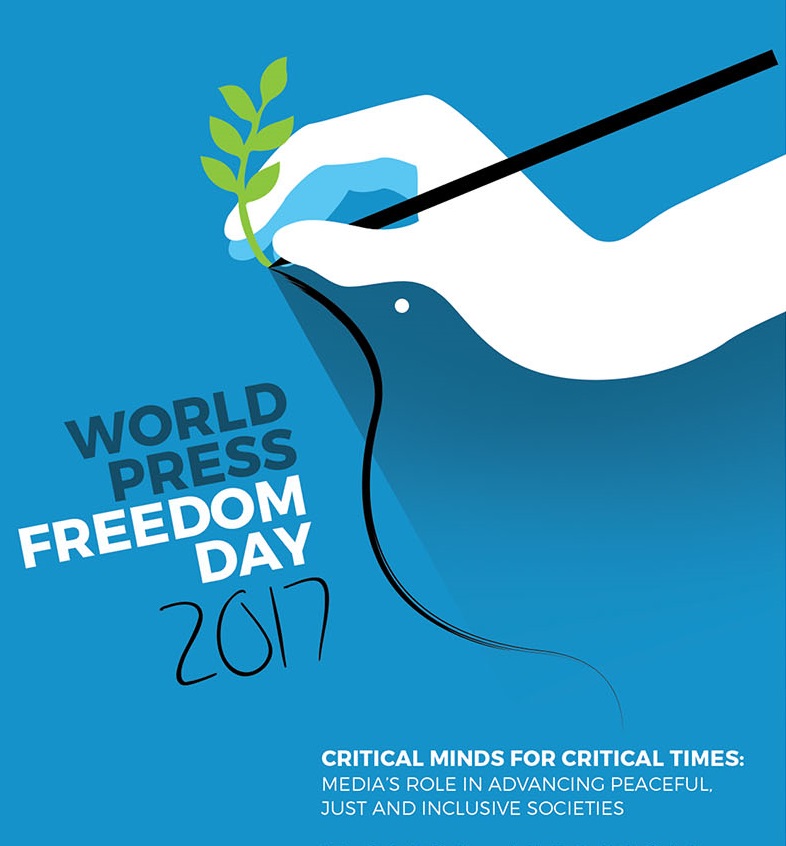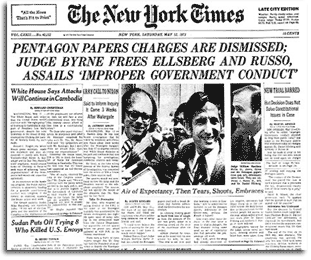
Freedom of the press is one of the most important components of United States democracy, so inherent in its principles that it was included in the very first amendment to the federal Constitution
Topics on the Page
The First Amendment and the Massachusetts Declaration of Rights
Freedom of Press Around the World
- The Great Chinese Firewall
Notable Freedom of Press Court Cases
The Speech Rights of Student Journalists
America's Black Newspapers
Censorship and Banned Books
Biographies and Primary Sources:
https://www.coe.int/en/web/freedom-expression/speakers-biographies-special-interventions
https://www.britannica.com/story/250-years-of-press-freedom
https://www.history.com/topics/united-states-constitution/freedom-of-the-press
 Text of Amendment 1: U.S. Constitution (Freedom of Religion, Speech, Press, Assembly and Petition)
Text of Amendment 1: U.S. Constitution (Freedom of Religion, Speech, Press, Assembly and Petition)
Congress shall make no law respecting an establishment of religion, or prohibiting the free exercise thereof; or abridging the freedom of speech, or of the press; or the right of the people peaceably to assemble, and to petition the Government for a redress of grievances.
 Article 16: Massachusetts Declaration of Rights (1780)
Article 16: Massachusetts Declaration of Rights (1780)
The liberty of the press is essential to the security of freedom in a state: it ought not, therefore, to be restrained in this commonwealth.
Article of Amendment, Article 77 (1948)
Article 16 of the First Part is hereby annulled and the following is adopted in place thereof:
Article XVI. The liberty of the press is essential to the security of freedom in a state: it ought not, therefore, to be restrained in this commonwealth. The right of free speech shall not be abridged.
Freedom of the Press, from American Civil Liberties Union
A Free Press Begins at School, NCTE Blog (December 12, 2018)
Dive into Freedom of Speech and of the Press with the Heritage Guide to the Constitution, Heritage Foundation or this overview and additional sources from Lincoln University.
 Check out this video on 'why press freedom is your freedom' from CNN.
Check out this video on 'why press freedom is your freedom' from CNN.
Watch this Crash Course video on Freedom of the Press
Here are some more multimedia sources:
https://www.youtube.com/watch?v=Vtpd0EbaFoQ&pp=ygUUZnJlZWRvbSBvZiB0aGUgcHJlc3M%3D
https://www.youtube.com/watch?v=A-OvJjAw2Jo&pp=ygUUZnJlZWRvbSBvZiB0aGUgcHJlc3M%3D
https://www.youtube.com/watch?v=SECzw-3gHUM&pp=ygUUZnJlZWRvbSBvZiB0aGUgcHJlc3M%3D

Freedom of the Press Around the World
2018 Freedom of Press Index from Reporters without Borders
10 Most Censored Countries, from Committee to Protect Journalists (2015)
Multicultural Sources:
https://www.thefire.org/news/blogs/eternally-radical-idea/free-speech-fosters-cultural-diversity-part-9-answers-bad
https://www.ohchr.org/en/instruments-mechanisms/instruments/universal-declaration-cultural-diversity
https://www.ala.org/advocacy/intfreedom/censorship
The Great Chinese Firewall
The Great Firewall of China Blocks Wikipedia (May 14, 2019)
 The Great Firewall of China, Amnesty International
The Great Firewall of China, Amnesty International
Which of these websites can people access in China?
- www.amnesty.org.uk (Amnesty International’swebsite about human rights)
- www.youtube.com (a site where people put up their own videos)
- www.chinatimes.com.tw (a Chinese website based in Taiwan)
- http://en.olympic.cn (a website of China’s Olympic Committee)
Answer: Only the website for China's Olympic Committee
 Notable Freedom of Press Court Cases
Notable Freedom of Press Court Cases
Being as important and prominent of an amendment as it is, the right to freedom of the press has come into contention many times over the years, and has often made it all the way to the Supreme Court of the United States.
Major Freedom of the Press Court decisions Bill of Rights Institute
Key Court Cases: Press, from the First Amendment Center
Schenck v. the United States, 1919
Charles Schenck was a member of the Socialist Party, and during World War I distributed pamphlets encouraging men to dodge the draft. The US government viewed this as violating the 1917 Espionage Act, which prevented actions opposing the recruitment process. Schenck was punished, and the ruling was upheld in the Supreme Court. Justice Oliver Wendell Holmes Jr. argued that you can’t shout fire in a crowded theater, and that opposing the draft during times of war similarly endangers the public.
Was the ruling overly restrictive? Here’s a Washington Post article claiming the ruling has been built upon in following decades to limit freedom of the press.
 Here’s a learning plan from the Bill of Rights Institute in which students are asked to analyze primary sources and determine if the ruling was justified.
Here’s a learning plan from the Bill of Rights Institute in which students are asked to analyze primary sources and determine if the ruling was justified.
 Here’s a video about the case.
Here’s a video about the case.
Near v. Minnesota (1931)
The defendant, Jay Near, published “The Saturday Press,” a controversial and prejudicial newspaper intended to expose corruption in government that criticized and offended many powerful people. In 1925, he was stopped from publishing the paper and convicted in court under a Minnesota Public Nuisance Law that banned the distribution of “malicious, scandalous and defamatory” materials. Central to the case was the idea of “prior restraint,” meaning the government can prevent in advance the publishing of material it considers objectionable.
The Supreme Court overturned Near's conviction, thereby establishing "a constitutional principle, the doctrine that, with some narrow exceptions, the government could not censor or otherwise prohibit a publication in advance, even though the communication might be punishable after publication in a criminal or other proceeding" (Near v. Minnesota).
A more detailed summary of this case can be found at the Bill of Rights Institute.
- The case served as a precedent in 1971 when the court ruled against the Nixon Administration's efforts to prohibit the publication of the Pentagon Papers.

In 1960, L. B. Sullivan, one of the leaders of the Montgomery, Alabama police department, sued the New York Times for libel (printing knowingly false and harmful information). The paper had run an advertisement from civil rights groups that included charges about police activities, some of which were exaggerated and therefore not true. Sullivan sought financial compensation for damages to his reputation.
The Supreme Court declared that the First Amendment protects the publication of statements in newspapers, even false ones, about the conduct of public officials except when the statements can be proved to have been made with “actual malice.” In extending the protection of freedom of the press, the Court said, “debate on public issues should be uninhibited, robust, and wide-open” and that was more important than occasional errors in fact that may appear in print.
A more detailed summary of this case can be found at theBill of Rights Institute.
- First Amendment protects publication of statements, even false ones, about the conduct of public officials except when made with actual malice
- This case vehemently protects the freedom of the press, and in creating the new standard of proving 'actual malice' made it very difficult to condemn the press going forward
The New York Times Co. v. United States (1971)
New York Times Co. v. United States, also known as the Pentagon Papers case, happened when President Richard Nixon sought to block the New York Times and The Washington Post newspapers from publishing classified Defense Department materials about American conduct in the Vietnam War. Daniel Ellsberg, a former war analyst and whistleblower, had leaked the information to the press. The Supreme Court ruled against the Nixon Administration’s efforts to prohibit the publication of the Pentagon Papers citing the Near v. Minnesota case as precedent.
A more detailed summary of this case can be found at the Bill of Rights Institute.
- Schools had a right to refuse to allow the publication of two articles in the school newspaper that officials deemed "inconsistent with the shared values of civilized social order.
Berkeley, California High School Student Newspaper (August 23, 2012)

The Speech Rights of Student Journalists Act
Breaking News: Speech Rights of Student Journalists Bill is Law! Illinois Journalism Education Association (July 29, 2016)
 Text of the Speech Rights of Student Journalists Act
Text of the Speech Rights of Student Journalists Act
California and Massachusetts have passed legislation forbidding censorship of school papers unless the censored material would have disrupted the functioning of the school.
New Jersey is currently considering enacting such legislation.

Link to proposed 2019 legislation, the Hawaii Student Free Expression Act
Resources for High School Press Freedom and Censorship, from Student Press Law Center
.png)
Student Reporting Labs, PBS Newshour
News Literacy Curriculum for Educators, American Press Institute
America's Black Newspapers
Poster for 116th Anniversary of the Negro Press, issued 1942

Freedom's Journal (1827-1829)
John B. Russworm, founder of the first newspaper owned and operated by African Americans, Freedom's Journal in 1827.
Explore numerous publications from African Americans throughout history from the Black Press Research Collective
The North Star
- Frederick Douglass founded this abolitionist newspaper in 1847
The Jim Crow-Era Black Press: Of and For Its Readership
The Chicago Defender
- Bound for the Promised Land, from The Atlantic about the connections between The Chicago Defender and the Great Migration of African Americans from the South to the North
The Los Angeles Wave has the most subscribers in the United States today.
 Teaching and Learning Resources
Teaching and Learning Resources
"PriorRestraint and the Presumption of Unconstitutionality
The Importance of a Free Press, Facing History and Ourselves
5 Lesson Plans to Celebrate World Press Freedom Day, Pulitzer Center (May 2018)
.png) When May the Government Enjoin Publications Threatening to National Security or the General Welfare?
When May the Government Enjoin Publications Threatening to National Security or the General Welfare?
To help students interact with an idea they might find dull or take for granted, consider implementing ideas from these lesson plans
- The Price of a Free Press - From PBS, following 'a veteran reporter and his colleagues at Zeta, a Tijuana-based independent newsweekly... in one of the deadliest places in the world for members of the media'.
.png) Censorship and Banned Books
Censorship and Banned Books
Banned Books Week Resources
Banned and Challenged Books, American Library Association (2018)
Banned Books: 10 of the Most-Challenged Books in America, BigThink (September 28, 2018)
Remember when people tried to ban Harry Potter? They're still at it.
Get Ready to Celebrate Banned Books Week, ReadWriteThink
A Case for Reading: Examining Challenged and Banned Books, ReadWriteThink
.png) Should Violent Video Games Be Banned?
Should Violent Video Games Be Banned?
Comments (0)
You don't have permission to comment on this page.